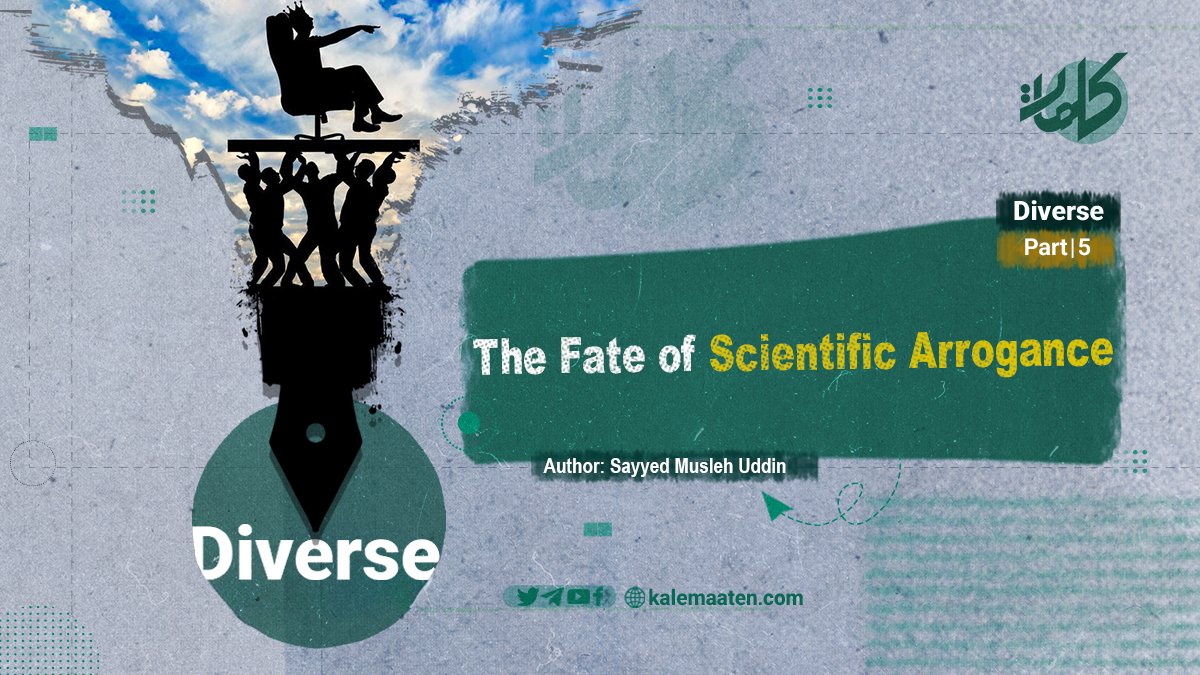Author: Sayyed Musleh Uddin
The Fate of Scientific Arrogance (Part Five)
The Arrogance of Sufis:
Some individuals among the Sufis are deluded and conceited. They wear the outward appearance and attire of sincere and genuine Sufis, imitating them in speech, mannerisms, and ceremonies. They mimic their terminology and external states, such as spiritual ecstasy (wajd), music-based devotion (samaʿ), and so forth, thinking that Sufism consists solely of these outward displays and nothing more.
Another group among them claims to possess the knowledge of gnosis (maʿrifah), direct witnessing of the Divine (mushāhadah al-ḥaqq), spiritual progression through various stations (maqāmāt), and attainment of exalted states (aḥwāl). They even claim to be united with Divine Essence (ʿayn) and to have reached nearness to Allah.
They use incoherent and baseless words to attract followers and pretend as if they speak through revelation and disclose divine secrets. Their speech is so superficially refined (yet inherently hollow) that farmers abandon their farming, and weavers leave their weaving,[1] along with other tradespeople who abandon their crafts to stay with them for a time—just to listen to these externally adorned yet internally empty speeches.
This group of Sufis looks down on jurists, Qur’anic commentators, hadith scholars, and all types of learned scholars, let alone the general public. They portray themselves as those who have reached the truth and are among the spiritually elite. Yet in the sight of Allah, they are among the fāsiqūn (open sinners) and munāfiqūn (hypocrites), and in the view of true and sincere Sufis, they are ignorant and foolish. May Allah protect us from such a state—it is a level of ruin and destruction.[2]
A Trait Belonging Solely to Allah:
وَالْكِبْرِيَاءِ لِرَبِّنَا صِفَةٌ لَهُ مَخْصُوصَةً فَتَجَنَّبْهَا وَاتَّقِي
Translation: Arrogance is a trait belonging solely to our Lord—so avoid it and beware.
It is unbecoming of scholars to humble themselves out of greed. They must avoid whatever brings disgrace upon knowledge and its people and must always maintain humility—a humility balanced between arrogance and humiliation. If self-admiration enters one’s humility, it becomes pride.
وَمِنَ الْعَجَائِبِ عُجْبُ مَنْ هُوَ جَاهِلٌ فِي حَالِهِ أَهُوَ السَّعِيدُ أَمِ الشَّقِي
Translation: How astonishing it is that someone who is ignorant of his own state should be self-admiring—does he even know whether he is blessed or miserable? [3]
Scientific Arrogance Knows No Bounds:
Once, Prophet Musa (Moses), peace be upon him, was among a group of the Children of Israel when a man approached him and asked, “Do you know of anyone more knowledgeable than yourself?” Musa replied, “No.”
Then Allah revealed to Musa: “Yes—Our servant Khidr is more knowledgeable than you.” Musa requested guidance on how to reach him. Allah appointed a fish as a sign and told him, “When you lose the fish, return—there you will meet him.”
Later, the young man accompanying Musa said, “Do you remember when we rested by that rock? I forgot to mention that the fish came to life and made its way miraculously into the sea. Satan caused me to forget to tell you.”
Musa said, “That is what we were seeking!” So, they retraced their steps and found Khidr there, and the story continues as Allah Almighty has narrated in His Book. [4]
Thus, Allah reminded Musa that, yes—there is someone more knowledgeable than you. A person must not consider themselves more learned than others.
A Sign of Sincerity:
Allah, the All-Knowing and All-Aware, is aware of a person’s inner state. He sees how much sincerity lies within the heart of a seeker of knowledge and how much worldly motive is present. Therefore, a student of sacred knowledge and a religious scholar should not be prideful about their intelligence and capabilities.
We have all heard the word ikhlāṣ (sincerity) many times and are well aware of its importance. Yet unfortunately, we seldom strive to truly attain it. We all know that without sincerity, any good deed is but a lifeless shell.
Perhaps each of us claims that our hearts are full of sincerity and the pursuit of Allah’s pleasure—that we have no aim other than divine approval. But since sincerity is an inner state that others cannot outwardly detect, some scholars have offered signs by which it may be recognized.
As Allamah ʿAbd al-Wahhab al-Shaʿrānī (MABH) says: “If you are serving the religion in a particular region—whether through teaching, learning, preaching, guiding disciples, or similar efforts—and then you see another person in that same region beginning to work in the same field, and he is more effective and skilled in religious matters, and people are more influenced by his words, then:
If you are sincere and your goal is the religious upliftment of the people, the eradication of innovations and superstitions, and the spread of the Qur’an and Sunnah, you will be genuinely happy about his presence. You will consider him a help and a blessing from your Lord. You will even encourage your students and followers to benefit from him, knowing that this cooperation has made your burden easier and your task lighter.
But if your sincerity is weak, you will feel disturbed and saddened. You will secretly wish that he commits a mistake so that people’s trust in him is broken, hoping that he leaves the scene and the field becomes exclusively yours.”
Continues…
Previous Part/ Next Part
[1] – Julah: Weaver, textile worker.
[2] – Mukhtasar Ihya al-Ulum, p. 404.
[3] – Adab Faragir-e Elm (Etiquette of Learning), p. 76.
[4] – Translation of Bukhari, p. 70.



